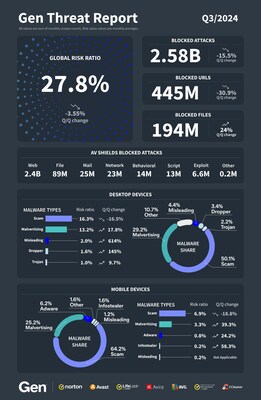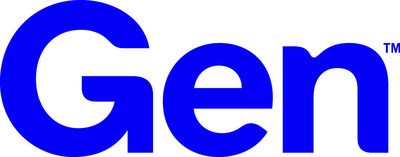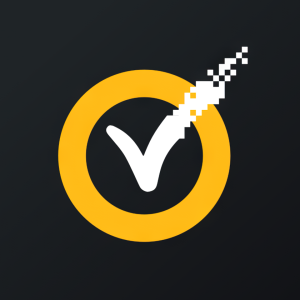Gen Q3 Threat Report: Millions Fooled by "Scam-Yourself Attacks"
Rhea-AI Summary
Gen's Q3/2024 Threat Report reveals alarming cybersecurity trends, including a 614% increase in 'Scam-Yourself Attacks' where users are tricked into installing malware. Data stealing malware activity rose 39%, with Lumma Stealer increasing by 1154%. Ransomware threats doubled in risk ratio, while mobile threats escalated with spyware growing 166% and banking malware up 60%. The report identifies various attack methods including fake tutorials, ClickFix scams, FakeCaptcha, and fake updates. Norton Genie data shows smishing attempts (16.5%), lottery scams (12%), and package delivery scams (9.6%) as prevalent threats.
Positive
- Norton Genie App provides real-time AI-driven threat detection against evolving cyber threats
- Company offers free decryption tools for ransomware victims
Negative
- 614% surge in 'Scam-Yourself Attacks' indicating increased vulnerability of users
- 39% increase in data stealing malware activity
- 100% rise in ransomware risk ratio
- 166% growth in mobile spyware threats
- 60% increase in banking malware attacks
News Market Reaction 1 Alert
On the day this news was published, GEN declined 0.14%, reflecting a mild negative market reaction.
Data tracked by StockTitan Argus on the day of publication.
Report Finds
"In July through September, scams continued to dominate the threat landscape, while data-theft abusing malware and ransomware also increased rapidly," said Siggi Stefnisson, Cyber Safety CTO at Gen. "Our consistent focus is to empower people with the tools they need, such as the Norton Genie scam detector, so they can protect their digital lives as threats evolve."
A
The Gen report highlights a
- Fake Tutorials – cybercriminals use video tutorials on platforms like YouTube to lure people into installing malware while pretending to provide a free download for a paid software.
- ClickFix Scams – under the guise of "fixing" a computer issue, a fake technical solution prompts people to copy a text into the command prompt, ultimately giving cybercriminals control of their system.
- FakeCaptcha – a fake CAPTCHA prompt that copies text of a dangerous code onto your clipboard and instructs the person to install this malicious content onto their device.
- Fake Updates – malware disguised as a necessary software update guides people to paste a malicious script into their system, giving attackers admin privileges.
Together, these Scam-Yourself Attacks form a broader web of deception that's catching millions of people off guard. Social engineering continues to be one of the most dangerous tools in the cybercriminal arsenal, underscoring the importance of security products to help detect and block malware before it's downloaded.
The Surge of Data theft using Data Stealing Malware and Ransomware
While scams have dominated the landscape, data stealing malware and ransomware are experiencing a resurgence. Data stealing malware activity, specifically information stealers, rose by
Ransomware threats also increased, with a notable
Gen researchers collaborate with governments around the world to combat ransomware by providing free decryption tools for victims, and most recently released the Avast Mallox Ransomware Decryptor.
Mobile Threat Escalation: Data Stealing Malware Focusing on Identity and Financial Theft
Data stealing malware also increased on mobile devices in Q3/2024, with criminals having an eye toward identity theft. Spyware, software that gains access to sensitive data and can even screen-record, grew
Banking malware – used mainly to collect banking credentials – increased by
A common denominator for the key mobile threats is their delivery via malicious SMS messages. Avast, a brand of Gen, continues to enhance its defenses against mobile-specific threats, knowing that proactive protection is critical as consumers rely more on mobile devices for personal and financial transactions. To stay safe, people should avoid clicking links in unsolicited SMS messages and ensure they have comprehensible mobile security software, such as Avast Mobile Security, to help protect them.
Norton Genie Insights: Real-Time Scam Defense in Action
As AI technologies advance, they're increasingly used by both cybercriminals and defenders. We continued to observe attackers leveraging AI-driven tactics to enhance social engineering campaigns—like generating realistic deepfakes and crafting highly tailored phishing emails and SMS messages —making scams harder to detect. Gen's AI-driven Norton Genie App adapts in real time to these advancements, empowering people with proactive, real-time threat detection against AI-enhanced deception.
Norton Genie telemetry data from 2024 highlights that after generic scams, smishing attempts –SMS messages pretending to be from banks, delivery services or government agencies, urging people to click a malicious link – are the most common scams seen by people (
This real-time scam data helps Gen continuously refine its protections, ensuring its defenses adapt as quickly as the threats people are facing.
To read the full Q3/2024 Gen Threat Report, visit: https://www.gendigital.com/blog/insights/reports/threat-report-q3-2024
About Gen
Gen™ (NASDAQ: GEN) is a global company dedicated to powering Digital Freedom through its trusted Cyber Safety brands, Norton, Avast, LifeLock, Avira, AVG, ReputationDefender and CCleaner. The Gen family of consumer brands is rooted in providing safety for the first digital generations. Now, Gen empowers people to live their digital lives safely, privately, and confidently today and for generations to come. Gen brings award-winning products and services in cybersecurity, online privacy and identity protection to nearly 500 million users in more than 150 countries. Learn more at GenDigital.com.
Brittany Posey-Thomas | Courtney Rowles |
Gen | Edelman for Gen |
![]() View original content to download multimedia:https://www.prnewswire.com/news-releases/gen-q3-threat-report-millions-fooled-by-scam-yourself-attacks-302309060.html
View original content to download multimedia:https://www.prnewswire.com/news-releases/gen-q3-threat-report-millions-fooled-by-scam-yourself-attacks-302309060.html
SOURCE Gen Digital Inc.









